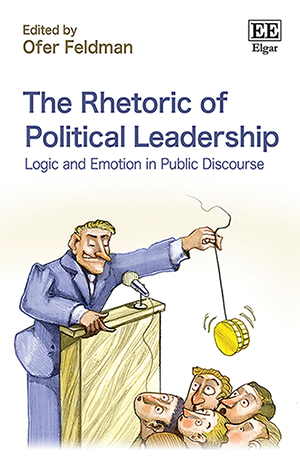The Rhetoric of Political Leadership: Logic and Emotion in Public Discourse
Edited by : Ofer Feldman
Release date: Feb 2020
Edward Elgar Publishing
Number of pages: 246
ISBN: 9781789904574


This timely book details the theoretical and practical elements of political rhetoric and their effects on the interactions between politicians and the public. Expert contributors explore the issues associated with political rhetoric from a range of disciplinary perspectives, including political science, linguistics, social psychology and communication studies.
Investigating critical emerging topics, such as invited behavior, political public relations, artificial intelligence and ‘chatbots’, this book offers a comprehensive overview of the current state of the field. Empirical data gathered from around the globe facilitates comparison of the different structures, practices and effects of political rhetoric employed across various cultural contexts. Chapters examine what makes a speech effective, politicians’ use of moral appeals in political advertising, political attacks on social media, and gender and emotion in political discourse.
The Rhetoric of Political Leadership will be a key resource for scholars and students of political science, communication studies and social psychology, particularly those focusing on cross-cultural perspectives. It will also appeal to those working in leadership and politics that are seeking an in-depth understanding of the importance and use of discourse in the political arena.
Contents
1. Introduction: persuasive speaking and evoking political behavior
Ofer Feldman
PART I PERSUASIVE LEADERSHIP: EMOTION, STYLE, AND IDENTITY IN NATIONAL AND INTERNATIONAL ARENAS
2. Gender, emotion and political discourse: masculinity, femininity and populism
Carol Johnson
3. What makes a speech effective? Netanyahu’s and Obama’s SPECtrum of Rhetoric Intelligences (SPEC/RI) in United Nations speeches 2009–2012 34
Michelle Stein Teer
4. Xi Jinping’s governance philosophy and language style: analysis of the Chinese leader’s speeches
Jianxin Wang
5. The French state of emergency: marginalization of the Muslim minority as a consequence of state self-legitimation
Bruno Mendelski
PART II EVOKING BEHAVIOR: THE RHETORIC OF PRESIDENTIAL INAUGURATION, TELEVISED INTERVIEW, AND ELECTION CAMPAIGN
6. Battling for America’s soul: Donald Trump, invited behavior, and the midterm elections of 2018
Michael Alan Krasner
7. Political Public Relations (PPR) techniques: emotional input and output
Albina Gayoso
8. The rhetoric of broadcast talk shows in Japan: the art of equivocation as a political skill
Ofer Feldman
9. Politicians’ use of moral appeals in British political advertising 1983–2017
Annemarie Walter
10. Facial expressions in election campaign posters: the effect of smiling on winning political seats during the 2017 Japanese lower house election
Masahiko Asano
PART III SOCIAL MEDIA DISCOURSE: POPULISM, NEGATIVE CAMPAIGNS, AND THE USE OF ARTIFICIAL INTELLIGENCE
11. They are lying to us! The rhetoric of direct communication by populist politicians and its effects on the electorate: evidence from the Netherlands
Michael Hameleers
12. Emotion, reason, and political attacks on Facebook : the use of rhetorical appeals in the 2014 Brazilian presidential race
Ícaro Joathan and Francisco Paulo Jamil Marques
13. Political discourse through artificial intelligence: parliamentary practices and public perceptions of chatbot communication in social media
Chen Sabag Ben-Porat and Sam Lehman-Wilzig











